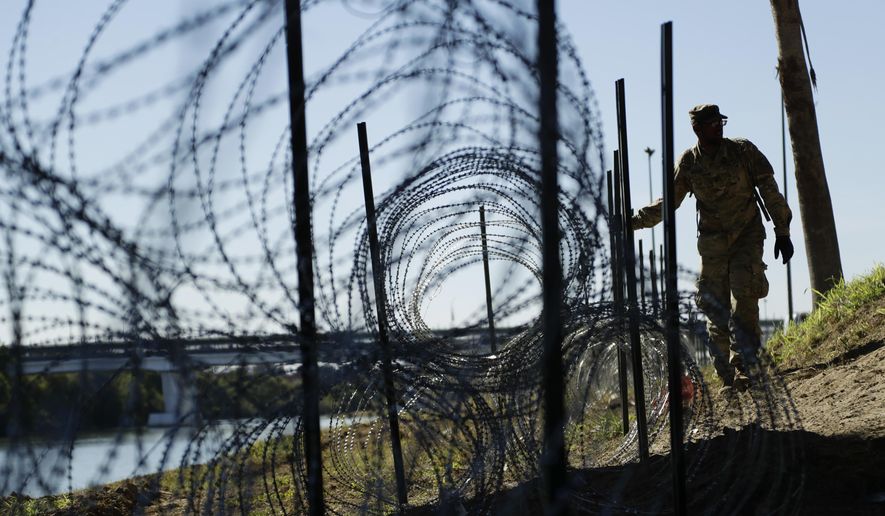The White House sent a memo to the Pentagon this week granting troops stationed at the border permission to engage in some law enforcement tasks, and to use lethal force if they get endangered.
Pentagon officials were reviewing the memo Wednesday, and it was unclear whether any of the more than 8,000 active-duty and National Guard troops have begun to carry out expanded duties, which reportedly include the ability to engage in crowd control and temporary detention and to perform quick searches.
A presidential memo obtained by Newsweek shows the enhanced powers are particularly aimed at defending against the migrant caravans that are camped out on the Mexican side of the border, after having crashed their way through the Guatemala-Mexico border late last month. President Trump is intent on avoiding a repeat.
“There are a lot of criminals in the caravan. We will stop them,” Mr. Trump tweeted Wednesday afternoon.
Mr. Trump is holding a teleconference on Thanksgiving with members of the military, the White House said.
Final decisions on what powers the troops will have rests with Defense Secretary James Mattis, though the memo makes clear they could include use of “lethal force, where necessary” to protect other federal personnel on the border. The troops would not be permitted to make arrests or seizures.
Homeland Security said it welcomed the new assistance.
“As Secretary [Kirstjen] Nielsen has said, we will not allow our frontline personnel to be in harm’s way,” said spokeswoman Katie Waldman. “We will do everything we can to protect those who defend our nation’s sovereignty and secure our border. We appreciate the Department of Defense stepping in to assist the Department of Homeland Security as needed.”
The memo makes good on Mr. Trump’s insistence that the military play a more active role in preventing the migrant caravans from overrunning the U.S. border, as they did a month ago on Mexico’s southern border.
Video of immigrants overpowering Mexican police stunned U.S. officials.
Mr. Trump said he wanted as many as 15,000 troops on the border to greet the caravan. Instead, fewer than 6,000 have been deployed, along with about 2,100 National Guard troops sent earlier this year.
Their missions had been severely restricted. The National Guard was doing vehicle maintenance, clerical support and some surveillance duties, while the new active-duty troops were supposed to be working to lay razor wire and erect barriers to enhance physical security at ports of entry.
Brandon Judd, president of the National Border Patrol Council, said agents want to see the military do as much as possible to assist on the border.
“We have to do something. We’re at the point where we have no choice. I believe that when this month ends, I believe it’s possible we could end up apprehending more illegal aliens than in any month in the Obama administration, including any month in 2014,” he said, referring to the previous major surge.
He said the troops should not perform full law enforcement duties like arrests, saying that opened a Pandora’s box of other issues. But he said having them upfront on the border to add more eyes spotting crossings would be a major help.
Mr. Judd said smuggling cartels recruit migrants in Central America and push them to make the trip north, even controlling where they try to enter the U.S. so they can be used as a distraction. While agents respond to large groups of migrants, more high-value contraband is smuggled where gaps have opened up.
Mr. Judd said in addition to providing more eyes, the military could be used to process and detain illegal immigrants while they’re awaiting transfer to U.S. Immigration and Customs Enforcement custody. He said the old Immigration and Naturalization Service used to have non-law enforcement officers perform detention duties, freeing agents up to be on the front lines.
“We’re supporting anything and everything the military can do,” he said.
Immigrant-rights activists were less enthusiastic about the memo, which came in the form of what the government is calling a “Cabinet order” signed by White House Chief of Staff John F. Kelly.
“This legally dubious ’Cabinet order’ creates confusion, undermines morale, and may very well lead to violence,” said Michael Breen, president of Human Rights First.
Those legal questions chiefly surround the Posse Comitatus Act, which severely restricts the use of the military for law enforcement on U.S. soil.
But Stephen Mihm, a history professor at the University of Georgia, says it may be tough for Mr. Trump’s opponents to use the law against him.
“The Posse Comitatus Act has a vexed history, one that makes it difficult to invoke. Moreover, loopholes have multiplied over the years. No one has ever been prosecuted for violating it,” he wrote in a commentary for Bloomberg View.
Part of the problem, he said, is the law’s origins in 1878 when it was included as part of a broader bill, and was backed by Southern Democrats as part of a deal to prevent Republican presidents from using troops to enforce election laws protecting blacks in the South.
The Posse Comitatus Act specifically allows troops to be used for domestic enforcement when the president deems it an emergency — something Mr. Trump has repeatedly said the caravans constitute.
Homeland Security officials say some 10,500 migrants are camped along the border, with more than 6,000 in Tijuana alone. Some of them have attempted to climb parts of the border wall between Tijuana and San Diego, leading to an ever-increasing amount of razor wire being deployed.
U.S. officials say more than 500 criminals are among those in the caravans. Officials have declined to say how they know this, but NBC reported Wednesday that the U.S. has paid informants inside the caravan.
• Dave Boyer contributed to this report.
• Stephen Dinan can be reached at sdinan@washingtontimes.com.
• S.A. Miller can be reached at smiller@washingtontimes.com.




Please read our comment policy before commenting.